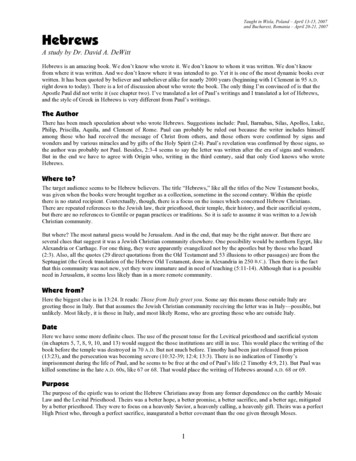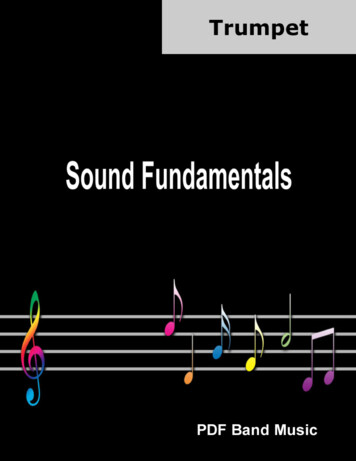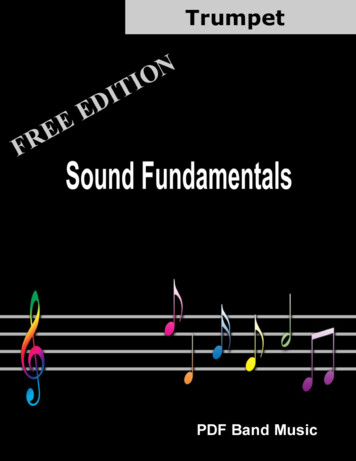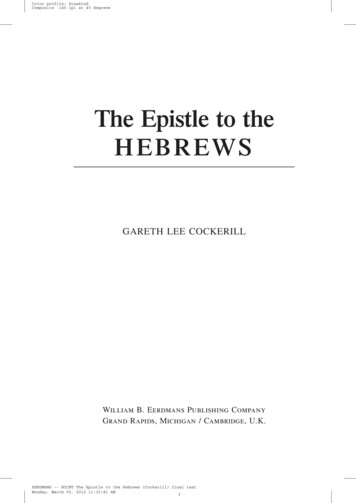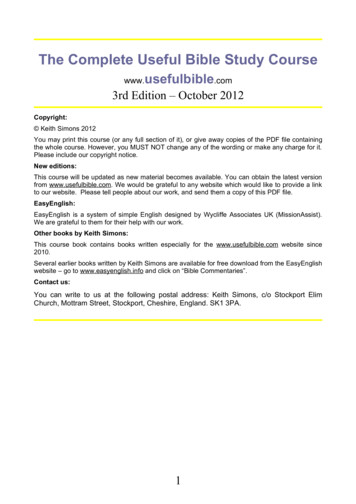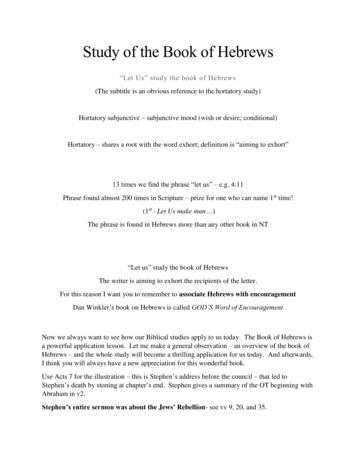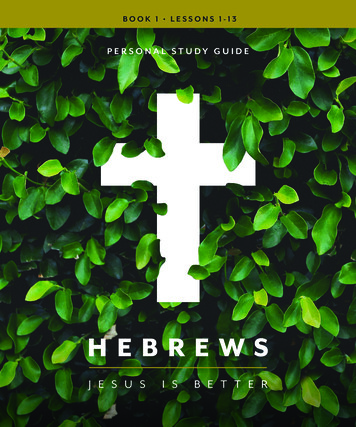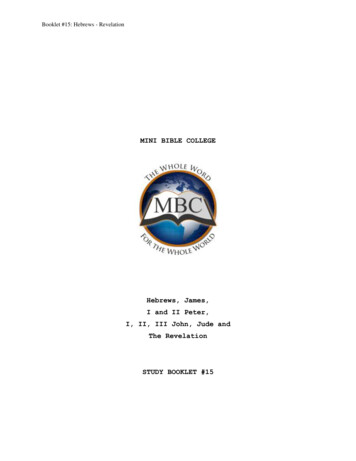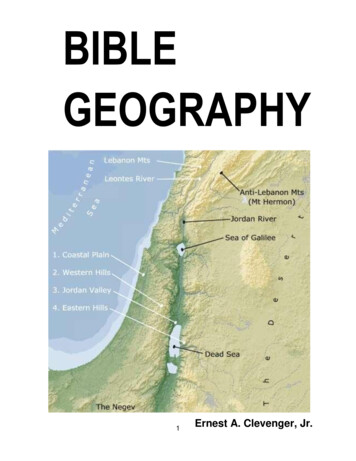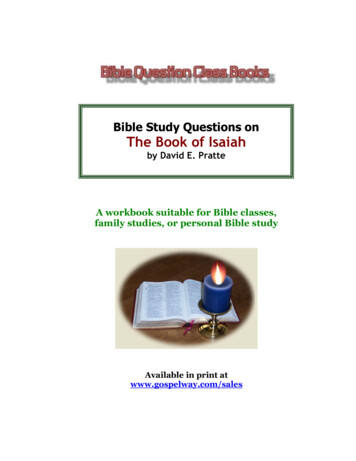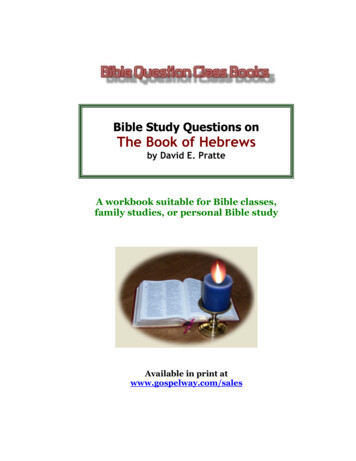
Transcription
Bible Study Questions onThe Book of Hebrewsby David E. PratteA workbook suitable for Bible classes,family studies, or personal Bible studyAvailable in print atwww.gospelway.com/sales
Bible Study Questions on the Book of Hebrews:A workbook suitable for Bible classes, family studies,or personal Bible study Copyright David E. Pratte, 2013, 2014Minor revisions, 2016All rights reservedISBN-13: 978-1496163493ISBN-10: 1496163494Printed books, booklets, and tracts available atwww.gospelway.com/salesFree Bible study articles online atwww.gospelway.comFree Bible courses online atwww.biblestudylessons.comFree class books atwww.biblestudylessons.com/classbooksFree commentaries on Bible books atwww.gospelway.com/commentaryContact the author atwww.gospelway.com/commentsNote carefully: No teaching in any of our materials is intended or should ever beconstrued to justify or to in any way incite or encourage personal vengeance orphysical violence against any person.“He who glories, let him glory in the Lord”– 1 Corinthians 1:31Front Page PhotoModel of the ark of the covenant(public domain photo via Wikimedia Commons)“Then indeed, even the first covenant had ordinances of divine service and theearthly sanctuary. For a tabernacle was prepared which had the golden censerand the ark of the covenant overlaid on all sides with gold, in which were thegolden pot that had the manna, Aaron's rod that budded, and the tablets of thecovenant; and above it were the cherubim of glory overshadowing the mercy seat. But Christ came as High Priest of the good things to come, with the greater andmore perfect tabernacle not made with hands, that is, not of this creation.” Hebrews 9:1-11Scripture quotations are generally from the New King James Version (NKJV), copyright 1982,1988 by Thomas Nelson, Inc. used by permission. All rights reserved.Workbook on HebrewsPage #2
Other Books by the AuthorTopical Bible StudiesGrowing a Godly Marriage & Raising Godly ChildrenWhy Believe in God, Jesus, and the Bible? (evidences)The God of the Bible (study of the Father, Son, and Holy Spirit)Grace, Faith, and Obedience: The Gospel or Calvinism?Kingdom of Christ: Future Millennium or Present Spiritual Reign?Do Not Sin Against the Child: Abortion, Unborn Life, & the BibleTrue Words of God: Bible Inspiration and PreservationCommentaries on Bible BooksGenesisJoshua and RuthJudges1 SamuelEzra, Nehemiah, and EstherJobProverbsGospel of MarkGospel of JohnActsRomansEphesiansPhilippians and ColossiansHebrews1 & 2 PeterBible Question Class BooksGenesisJoshua and RuthJudges1 SamuelEzra, Nehemiah, and EstherJobProverbsEcclesiastesIsaiahGospel of MatthewGospel of MarkGospel of LukeGospel of JohnActsRomans1 Corinthians2 Corinthians and GalatiansEphesians and PhilippiansColossians, 1&2 Thessalonians1 & 2 Timothy, Titus, PhilemonHebrewsGeneral Epistles (James - Jude)RevelationWorkbooks with Study NotesJesus Is Lord: Workbook on the Fundamentals of the Gospel of ChristFollowing Jesus: Workbook on DiscipleshipGod’s Eternal Purpose in Christ: Workbook on the Theme of the BibleVisit our website at www.gospelway.com/sales to see a current listof books in print.Page #3Workbook on Hebrews
Bible Study Questions on HebrewsIntroduction:This workbook was designed for Bible class study, family study, or personal study. The classbook is suitable for teens and up. The questions contain minimal human commentary, but insteadurge students to study to understand Scripture.Enough questions are included for teachers to assign as many questions as they want for eachstudy session. Studies may proceed at whatever speed and depth will best accomplish the needsof the students.Questions labeled "think" are intended to encourage students to apply what they have learned.When questions refer to a map, students should consult maps in a Bible dictionary or similarreference work or in the back of their Bibles. (Note: My abbreviation "b/c/v" means "book,chapter, and verse.")For class instruction, I urge teachers to assign the questions as homework so students cometo class prepared. Then let class time consist of discussion that focuses on the Scripturesthemselves. Let the teacher use other Scriptures, questions, applications, and comments topromote productive discussion, not just reading the questions to see whether they were answered“correctly.” Please, do not let the class period consist primarily of the following: "Joe, will youanswer number 1?” “Sue, what about number 2?" Etc.I also urge students to emphasize the Bible teaching. Please, do not become bogged downover "What did the author mean by question #5?" My meaning is relatively unimportant. The issueis what the Bible says. Concentrate on the meaning and applications of Scripture. If a questionhelps promote Bible understanding, stay with it. If it becomes unproductive, move on.The questions are not intended just to help students understand the Scriptures. They are alsodesigned to help students learn good principles of Bible study. Good Bible study requires definingthe meaning of keywords, studying parallel passages, explaining the meaning of the text clearly,making applications, and defending the truth as well as exposing religious error. I have includedquestions to encourage students to practice all these study principles.Finally, I encourage plain applications of the principles studied. God's word is written so soulsmay please God and have eternal life. Please study it with the respect and devotion it deserves!For whatever good this material achieves, to God be the glory.You can find Bible study commentary and notes to accompany these questions atwww.gospelway.com/sales David E. Pratte, June 21, 2017Workbooks, commentaries, and topical studies for sale in print atwww.gospelway.com/salesTo join our mailing list to be informed of new books or special sales, contact theauthor at www.gospelway.com/commentsWorkbook on HebrewsPage #4
Assignments on Hebrews 1Please read Hebrews 1 and answer the following questions:1. Skim the book of Hebrews and summarize its theme. Why was it written? (Think: What isknown about who wrote the book?)2. How did God speak “in times past” – 1:1? Explain when this refers to and to whom Hespoke.3. Special Assignment: Define “prophet.” Give passages showing God spoke byprophets.4. Describe some of the various ways by which God revealed His will to prophets.5. How has God spoken “in the last days” – 1:2? Explain how this differed from His speakingto the prophets.6. Who is the Son? Give other passages so identifying Him.7. Case Study: Suppose someone claims that “the last days” refers to the time right beforeJesus’ second coming. Give and explain b/c/v you would use to respond.8. List other passages about Jesus’ involvement in creation. (Think: What does this proveabout how long Jesus has existed?)Ongoing Assignment: Make a list of ways the gospel is superior to the Old Testamentaccording to Hebrews.Page #5Workbook on Hebrews
9. Explain “brightness of His glory” and “express image of His person” – 1:3. What does thisprove about the nature of Jesus?10. What else did/does Jesus do according to v3? List other passages about the significanceof God’s right hand.11. List other passages about Jesus’ Deity.12. What is Paul’s point in saying all these things about Jesus?13. How does Jesus compare to angels – 1:4?14. What application does this have to the difference between Old Testament and NewTestament (see Heb. 2:2,3)?15. Case Study: Some religious folks claim Jesus is Michael the Archangel. How does thiscontext apply to this view?16. As you proceed through this chapter, make a list of ways Jesus compares to angels.17. What passages are quoted in 1:5? What do they teach about Jesus?18. How does this compare Jesus to angels?Workbook on HebrewsPage #6
19. List other passages where Jesus is said to be begotten by God. (Think: In what sense didthe Father beget Jesus? Is this the same sense in which human fathers beget sons?)20. What is said of Jesus in 1:6? What passage is quoted here?21. May men or angels accept worship? Why or why not? Proof?22. List other passages where Jesus accepted worship. (Think: If men and angels worshipJesus, what does that prove about Jesus’ nature?)23. What passage in quoted in 1:7? What does that teach about angels?24. What passage is quoted in – 1:8,9? Summarize it.25. What expression in v8 confirms Jesus’ Deity? Who said this to Jesus (see context)? Whereelse has Jesus’ Deity been affirmed in this context?26. What other expressions in vv 8,9 describe Jesus’ authority or position? (Think: How doesthis distinguish Jesus from angels?)Page #7Workbook on Hebrews
27. What is Jesus’ view of righteousness and of sin? List other passages about these ideas.What should we learn?28. What passage is quoted in 1:10-12? Summarize it.29. What is the comparison between Jesus and the created things? Where else has Jesus beendescribed as Creator and/or as eternal?30. Special Assignment: What other terms are used to address the “Lord” in the contextof the original passage quoted here? What does this show?31. What do vv10-12 say about Jesus’ duration compared to created things? Where else is thetemporary nature of the earth taught? (Think: How does this contrast Jesus to angels?)32. What passage is quoted in 1:13? Where else have we read of Jesus at God’s right hand?(Think: How does this contrast Jesus to angels?)33. What position do angels have, and what work do they do – 1:14? Explain.Workbook on HebrewsPage #8
Assignments on Hebrews 2Please read Hebrews 2 and answer the following questions:1. What is the main point of 2:1-4?2. What application & conclusion does the writer draw in 2:1? How does this relate to chap.1?3. What danger does v1 warn about? What is the solution to this problem? (Think: Howaccurately does this verse describe the way Christians tend to go into sin? Is this a sudden orgradual process? Lessons?)4. What is the “word spoken through angels” – 2:2? Proof?5. What happened to those who transgressed that word? Give examples or b/c/v.6. What lesson should we learn – 2:3? Define “neglect.” Give examples. (Think: Are peoplelost only by deliberately rejecting God’s will? Explain.)7. How was the gospel made known to us (v3)? Where else has this been stated?8. What did God do for His message – 2:4? How?9. Define “sign,” “wonder,” and “miracle.” Where else do we read of gifts of the Spirit?Page #9Workbook on Hebrews
10. List other passages about the purpose of miracles.11. Special Assignment: Explain the purpose of miracles. Why were they needed? How didthey accomplish their purpose?12. What subject is discussed in 2:5-18?13. How does this relate to the theme of the Bible?14. What passage is quoted in – 2:6-8? Summarize it.15. What is man’s position compared to angels – 2:7? Compared to nature? (Think: Is thistalking about Jesus or man in general? Hint: study the context of the original passage.)16. List other passages about man’s dominion over nature – 2:8.17. In what sense are not all things subject to man (cf. vv 14,15)? What caused this?18. Who can solve this problem – 2:9? What position did He have to take and what price didHe pay to accomplish this?Workbook on HebrewsPage #10
19. What other passages teach similarly to 2:9? What position did Jesus receive again?20. For whom did Jesus die? What other passages teach this?21. What did Jesus’ suffering accomplish – 2:10? Why was this necessary? Had Jesus beenimperfect before? (Think: What is meant by “for whom are all things and through whom.”)22. What does 2:11-16 teach about Jesus’ nature? How does this compare to chap. 1?23. List several ways that these verses state or imply Jesus possessed this nature?24. What passage is quoted in 2:12? How does it prove Jesus’ nature?25. What does this verse teach about music in worship?26. Special Assignment: List and explain other passages showing the kind of music Godwants in worship today.27. What verses are quoted in 2:13? (Think: Explain the significance.)Page #11Workbook on Hebrews
28. According to 2:14, why did Jesus have to take this nature?29. In what ways is death a problem for us – 2:15? Explain.30. In what sense does Satan have the power of death?31. How did Jesus defeat Satan? List other b/c/v.32. Explain 2:16.33. How is Jesus compared to men in 2:17? Where else has this been stated?34. What reason is given in 2:17,18 why this had to be done?35. Where else is it stated that Jesus needed to experience human conditions in order toaccomplish His purpose effectively? Explain.Workbook on HebrewsPage #12
Assignments on Hebrews 3Please read Hebrews 3 and answer the following questions:1. What is the theme of 3:1-6? Summarize the people or groups that Jesus has been comparedto so far in Hebrews. (Think: What would the readers think of each of these groups? What is thepoint?)2. What terms describe the readers in 3:1? What does this tell about who they are? (Think: Inwhat sense is Jesus an apostle?)3. Special Assignment: Where else in Hebrews is Jesus said to be our High Priest?4. How are Jesus and Moses compared in – 3:2? What passage about Moses is referred tohere?5. How are Jesus and Moses compared in 3:3?6. Explain the house illustration – 3:3,4. What is the application to Moses and Jesus?7. What would the Hebrews think of Moses? What lesson should they learn?8. What secondary application can be made from v4 regarding the existence of God and thetheory of evolution?9. What differences between Moses and Jesus are discussed in 3:5,6?Page #13Workbook on Hebrews
10. In what sense was Moses’ work a testimony of things to be spoken afterward?11. What is required of us in order to benefit from Jesus’ position?12. What is Jesus’ house? Proof?13. What passage is quoted in 3:7-11? What is the point?14. According to 3:8&9, what problems did Israel have? (Think: Where else does chap 3 referto hardness of heart?)15. Give b/c/v and briefly describe examples in which Israel acted as described here.16. How did God view Israel’s conduct – 3:10? What was His attitude toward them?17. What conclusion did God reach regarding Israel – 3:11? Give Old Testament b/c/v.18. How does this discussion relate to the theme of Hebrews?Workbook on HebrewsPage #14
19. What danger did the Hebrews face – 3:12,13? Who else faces such danger?20. How do 3:12-14 connect to vv 7-11?21. Explain the role and importance of the heart in this context.22. What should we do (v13) to avoid this danger? Define “exhort.” (Think: In what ways issin deceitful?)23. What words in v13 express when and how often we should exhort one another? Explainthe significance.24. Who should give exhortation – 3:14? What lessons can we learn?25. What is required in order for us to be partakers with Christ? Explain.26. Define “confidence” and “steadfast.”27. Explain how 3:15 relates to the discussion and to the problem of the Hebrews.Page #15Workbook on Hebrews
28. Compare 3:12-14 to 10:24,25. How do our assemblies relate to our exhorting one another?What can we learn about the importance of attendance?29. Explain the questions and answers in 3:16,17?30. How many people sinned? What is the lesson?31. Name some excuses people sometimes offer for their misdeeds. What did God give as thereason these people were punished?32. What consequences did they suffer? What is the lesson?33. Compare the reasons they were punished in 3:18 to the reason given in v19. Explain theconnection.34. What is the “rest” these people could not enter? Give other references.35. Was this the 7th-day Sabbath rest they did not enter? Proof?Workbook on HebrewsPage #16
Assignments on Hebrews 4Please read Hebrews 4 and answer the following questions:1. What remains for us – 4:1? What dangers must we beware of? Explain.2. To whom was the gospel preached – 4:2? In what sense?3. Again in 4:2, what explanation is given for why Israel could not enter? Explain.4. What “rest” did Israel not enter? Why didn’t they enter (4:1-3)? Who will enter it?5. What “rest” is mentioned in 4:4? Give b/c/v.6. Is the “rest” of v4 the same as that of vv 3&5? Proof?7. Did God rest before or after He did His work? Application?8. Why did Israel not enter their rest – 4:6? How does resting relate to working?9. How does the author prove that a rest still remains – 4:7? Did David speak to people beforeor after Israel refused to enter Canaan?Page #17Workbook on Hebrews
10. Did people in the day of Joshua receive the rest David promised – 4:8? Proof? (Note: Sometranslations say “Jesus” in v8, but check newer translations.)11. What conclusion does the author reach in 4:9?12. What similarity exists between our rest and God’s – 4:10? Again, what comes first: workor rest?13. Summarize the different rests referred to in vv 1-10. Is the rest that remains for us theseventh-day Sabbath? Proof?14. Special Assignment: Prove by the Scriptures whether the seventh-day Sabbath is stillbinding.15. What conclusion does 4:11 reach regarding the previous verses?16. Describe the illustration used in 4:12.17. In what sense is God’s word like a sword? What power does it have? Explain.18. List other passages comparing the word to a sword or describing the power of the word.Workbook on HebrewsPage #18
19. What does 4:13 teach, and where else does the Bible teach it? (Think: How does thisconnect to v12?)20. To what subject does the author return in 4:14? Where else has it been discussed?21. How can we know Jesus can sympathize with us – 4:15? Where else has this beendiscussed?22. What success did Jesus have in dealing with temptation? Where else does the Bible teachthis?23. Special Assignment: Describe some temptations Jesus faced.24. What application does 4:16 make? What is the specific application to the Hebrews?25. List other passages about coming or drawing near to God.26. Case Study: Catholicism says we need Mary as mediatrix between Jesus and us becauseshe is more sympathetic and understanding than He is. How would you respond?Page #19Workbook on Hebrews
Assignments on Hebrews 5Please read Hebrews 5 and answer the following questions:1. What work do high priests do – 5:1? Give Old Testament b/c/v.2. What characteristic does one need to be a high priest according to 5:2? Explain.3. For whom does he offer sacrifice – 5:3? Why must he offer for himself too?4. How does Jesus fit the description of vv 1-3?5. How was a man chosen to be priest – 5:4?6. Give b/c/v showing how Aaron was chosen.7. Do modern denominational “priests” have the qualifications of v4? Explain.8. What passage is quoted in 5:5 regarding Jesus? What does it teach?9. What verse is quoted regarding Jesus in 5:6? What does it teach?10. What does this show about Jesus’ qualifications as priest?Workbook on HebrewsPage #20
11. How does 5:7 describe Jesus’ suffering? Define “supplication.”12. Give b/c/v for examples of the suffering of Jesus.13. How do you know God was able to save Jesus from death (b/c/v)? How do you know Godheard him?14. In what sense did Jesus learn obedience – 5:8. Had He been disobedient before?15. How did this make Him perfect – 5:9? Where else have similar things been said?16. In what sense is Jesus the author of salvation? Who will receive salvation?17. List other passages showing the necessity of obedience in salvation.18. Case Study: Many churches teach salvation by faith alone without obedience. Howwould you respond?19. Who made Jesus a high priest, and according to what order is He a priest – 5:10?20. Will it be easy to understand about Jesus’ Melchizedek priesthood – 5:11? Why would theHebrews especially have problems?21. List other passages about people who do not understand or are dull of hearing.Page #21Workbook on Hebrews
22. Explain the connection between teaching and the length of time one is a Christian – 5:12.(Think: Should all Christians be teachers? Explain.)23. List other passages regarding the importance of teaching.24. Why were these people not teachers? Explain why teachers need knowledge.25. List other passages about the importance of knowledge and Bible study.26. What is meant by “first principles”? Define “oracles.”27. Explain the illustration of milk and meat (solid food) – 5:13,14.28. Give other passages about the importance of growing and maturity. (Think: Is it wrongto be a baby? What is the author’s point?)29. What is required in order to understand God’s word (v14)? Define “discern.”30. Explain the point of v14. What is the connection between exercise and discernment?31. Special Assignment: Define “necessary inference.” Explain the connection between v14and necessary inference. Give other passages relating to necessary inference.32. Explain the application of vv 12-14 to the Hebrews’ problem.Workbook on HebrewsPage #22
Assignments on Hebrews 6Please read Hebrews 6 and answer the following questions:1. List 6 examples of “first principles” – 6:1,2. (Think: Can you explain the Bible teaching abouteach of these?)2. As time passes, what should Christians do with the first principles? What was theapplication to the Hebrews?3. What lessons can Bible teachers learn from 6:1-3? What can all members learn?4. What is meant by “laying on of hands” (v2)? Give Bible examples. (Think: Why is “baptisms”plural? What is meant?)5. What subject is discussed in 6:4-8? Why did the Hebrews need to consider this? (Think:What does this have to do with 5:12-6:3?)6. List 4 characteristics of the people discussed in vv 4,5.7. Define “enlighten.” What is the heavenly gift? (Think: How can one partake of the HolySpirit?)8. What do vv 4,5 tell you about who these people were? Were they saved or unsaved? (Think:What are the powers of the age to come?)9. What does 6:6 say about these people if they fall away?10. Special Assignment: List other passages and examples about children of God whosin. Can such people repent and return to God?Page #23Workbook on Hebrews
11. What do such people do to Jesus – 6:6? (Think: Does this help explain why these cannotbe restored to repentance? In what sense is it true that this is impossible?)12. What results can earth produce, and what consequences come as a result – 6:7,8?13. Explain this illustration. What is the application to the Hebrews and to us?14. Explain the application to “once saved, always saved.”15. Was the author convinced the Hebrews would be lost – 6:9? Explain.16. Why did he still have hope for them – 6:10?17. Will God forget what we have done? Explain. (Think: What lessons should people andteachers learn?)18. Define “diligence” and “sluggish” (or “slothful”) – 6:11,12.19. Instead of falling, what did the author want them to do? How long should they continue?20. List other passages regarding laziness, neglect, or indifference.21. Whom should we imitate? Explain and give examples. (Think: What is the application tothe Hebrews?)Workbook on HebrewsPage #24
22. Case Study: Some people have a double standard, expecting much of church leaders butexpecting less of themselves. Give some examples of this. Explain the application of 6:11,12.23. What promise does the author discuss beginning in 6:13? Summarize the whole promiseGod made to this man? Give b/c/v. (Think: Why would the author bring this up here?)24. Why would Abraham and these promises be of special interest to the Hebrews?25. Describe the point in Abraham’s life at which God swore to him with an oath – 6:14. Whatevent preceded this oath? In what sense was this after he had patiently endured?26. Describe the fulfillment of God’s promise to Abraham (6:15). Proof?27. What was the purpose of oaths – 6:16,17? By whom did God swear? Why not by someoneelse?28. What did God’s oath accomplish – 6:17,18? How did it benefit the Hebrews and us?29. What are the two immutable things (v18)?30. Why is hope important to us – 6:19? How is it like an anchor?31. What did the high priest do behind the veil? Give b/c/v.32. How is Jesus like the high priest? What subject is reintroduced in 6:20? (Think: Explainthe idea of the anchor entering the presence behind the veil — v19.)Page #25Workbook on Hebrews
Assignments on Hebrews 7Please read Hebrews 7 and answer the following questions:1. Look over chap. 7, especially vv 1-10. What theme is discussed?2. What does the Old Testament say about Melchizedek (give b/c/v)?3. What terms or names describe Melchizedek – 7:1,2? Think carefully about these terms, thenexplain how they differ from what the Law of Moses would allow.4. 7:3 is especially difficult. In what sense was Melchizedek “without father, without mother,without genealogy, having neither beginning of days nor end of life”? Were these things physicallytrue of Jesus?5. How does v3 differ from priesthood under the Law of Moses? What is the point regardingMelchizedek priesthood?6. What did Abraham give Melchizedek – 7:4? What does this show about Melchizedek?7. Who received tithes under the Law of Moses – 7:5? Give b/c/v.8. What was the purpose of these Old Testament tithes? Define “tithes.” (Think: Doesanything here prove people must tithe today? Explain.)9. How was the case of Abraham and Melchizedek similar to tithing under the Law of Moses?How was it different?10. What did Melchizedek do for Abraham – 7:6?Workbook on HebrewsPage #26
11. What principle is stated in 7:7 regarding blessing? Give Bible examples.12. What does this prove about Melchizedek? (Think: How would this surprise Hebrews?)13. What difference does 7:8 show between Melchizedek and the Levitical priesthood?14. What does 7:9,10 say about Melchizedek and Levites? In what sense is this true?15. What is the point of vv 9,10? (Hint: Who is greater: Abraham or Levi? Who is greaterAbraham or Melchizedek?)16. Summarize the point of vv 4-10 (note v4). (Think: How would this affect Hebrews?)17. What is the application of this discussion to Jesus?18. What conclusion does 7:11 reach regarding the Levitical priesthood? What does this proveabout the Levitical priesthood as compared to Jesus’ priesthood?19. What is the connection between the Levitical priesthood and the law? (Think: In whatsense is “perfection” meant here? Did God make a mistake in ordaining the Old Testamentpriesthood? Cf. 7:18,19; 10:1-18.)20. Special Assignment: Consider vv 4-11 (and following) as regards the use of necessaryinferences. Define “necessary inference.” Explain several necessary inferences used in theseverses. What should we learn about the use of necessary inferences?Page #27Workbook on Hebrews
21. What conclusion is reached in 7:12? Explain the significance.22. This is the first direct statement in Hebrews that the law has been changed. Where elsedoes the New Testament teach this?23. Explain how 7:13&14 confirm the conclusion of v12. (Hint: Compare the tribes of the kingsand priests.)24. How did the Old Testament indicate the tribe from which the Messiah would come?(Think: Again, how does this demonstrate the use of necessary inference?)25. What did Moses say about priests of the tribe of Judah – 7:14? What does this prove?26. Special Assignment: Explain the concept sometimes called “silence of Scripture.”Explain how the Bible establishes it as valid.27. How long did Psalm 110 promise the Messiah would serve as priest – 7:15-17? How didthis differ from Old Testament priests?28. In what sense did Old Testament priests serve according to a carnal commandment?29. What two offices did Melchizedek hold (cf. v1)? So what two offices did Jesus hold?30. What does this prove about when Jesus became king? What application can be made topremillennialism?Workbook on HebrewsPage #28
31. List phrases in 7:11-15 that indicate conclusions (inferences) are being drawn.32. What is the status of the former commandment – 7:18? Where else has this been said?33. Why was this done to the law – 7:18,19? Explain.34. In contrast to this, what do we have now (v19)? In what way is this better?35. What further advantage did Jesus have as priest – 7:20,21? How did this compare toLevitical priests?36. Where is this oath recorded, and what did it say? (Think: Where else have we read of anoath of God?)37. Define “surety” – 7:22. What is our surety?38. How does the new covenant compare to the old? Explain.39. Define “covenant.”40. How does Jesus’ priesthood differ from Old Testament priests according to 7:23,24? Whyis this an advantage?Page #29Workbook on Hebrews
41. What is the application of all this to the Hebrews and to us?42. What can Jesus do for us – 7:25? In what sense is this true?43. How does v25 relate to the previous verses? What does this teach regarding salvation byway of Old Testament priests or anyone else?44. Define “intercession.”45. How does 7:26 describe Jesus as High Priest? List terms used and define them.46. How did Old Testament priests differ from Jesus’ characteristics – 7:26,27?47. Why is Jesus’ character an advantage to His priesthood (v27)?48. What sacrifice did Jesus’ offer? Where else is this stated?49. How often did Jesus offer this sacrifice? How does this compare to Old Testamentsacrifices?50. How did Jesus’ character distinguish Him from the Old Testament priests – 7:28?51. Summarize the advantages of Jesus as priest according to vv 20-28.Workbook on HebrewsPage #30
Assignments on Hebrews 8Please read Hebrews 8 and answer the following questions:1. What main point is the author making – 8:1? Explain the connection to chap. 7.2. Explain the significance of Jesus being at God’s right hand. Where else have we studiedabout this?3. If Jesus is now at God’s right hand, what does this prove about His role as King (cf. Psalm110 and Heb. 7)?4. Where does Jesus serve as minister – 8:2? How did this differ from the Old Testament?(Think: What is this “true tabernacle”?)5. What work do priests do – 8:3, and where else have we read this?6. What does 8:4 teach about Jesus’ priesthood? Where else has this been taught? (Think:How could priests offer sacrifices according to the law, if the law had been annulled?)7. What purpose did these Old Testament
Workbook on Hebrews Page #4 Bible Study Questions on Hebrews Introduction: This workbook was designed for Bible class study, family study, or personal study. The class book is suitable for teens and up. The questions contain minimal human commentary, bu
